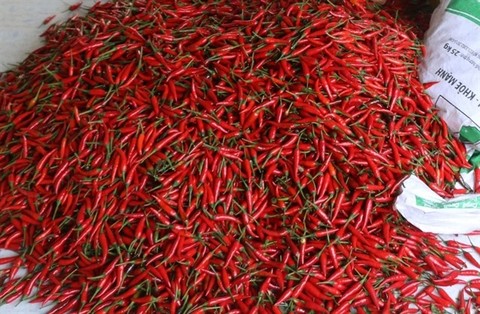
The Republic of Korea (RoK) and Taiwan have increased the inspection on imported chili to ensure safety and quality of these food items. — VNA/VNS Photo
The Republic of Korea (RoK) and Taiwan have increased the inspection on imported chili, including from Việt Nam, with aims to ensure safety and quality of these food items entering the markets.
The Việt Nam Trade Office in RoK said that it has received a notice from the South Korea’s Ministry of Food and Drug Safety (MFDS) about the re-designation of imported food that must be inspected when entering this market due to high rates of nonconformity.
Accordingly, chili products from Việt Nam will be subject to inspection, including cayenne, capsicum, chili pepper, red pepper, tabasco, for the residues of seven pesticides including diniconazole, tolfenpyrad, tricyclazole, permethrin, dimethoate, isoprothiolane and metominostrobin.
MFDS will extend the inspection order from March 30, 2024 to March 30, 2025 due to imported foods continuously failing to comply with standards and specifications.
Importers must have testing results from MFDS’s approved labs in order to import into RoK.
As of February 2, there are 2024 MFDS-approved laboratories in and outside Korea.
In Việt Nam, there are eight facilities approved by MFDS including: Center for Agroforestry and Fisheries Quality Region I (NAFIQAD I); NAFIQAD II; NAFIQAD III; NAFIQAD IV; NAFIQAD V; NAFIQAD VI; Intertek Vietnam Co., Ltd. - Can Tho branch laboratory; SGS Vietnam Co., Ltd. – Food laboratory.
Việt Nam Economic and Cultural Office in Taipei also received a notice from the Taiwanese authority on increasing inspection on all imported chili.
The move, starting from this month, aims to tighten quality management on imported chili amid safety concerns after some shipments from China were found to contain the banned cancer-causing dye additive Sudan Red III.
Products under increased inspection include fruits of the genus capsicum, crushed or ground, and other fruits of the genus Capsicum, dried, neither crushed nor ground.
According to TFDA’s notice, Taiwan has banned the customs clearance of chili from 21 enterprises from China, one from Việt Nam, one from Thailand and one from Mexico.
The General Department of Customs’ statistics showed that Việt Nam’s chili export totalled US$72 million in 2023, up 34.5 per cent against 2022, making chili one of the most important export vegetable products. — VNS